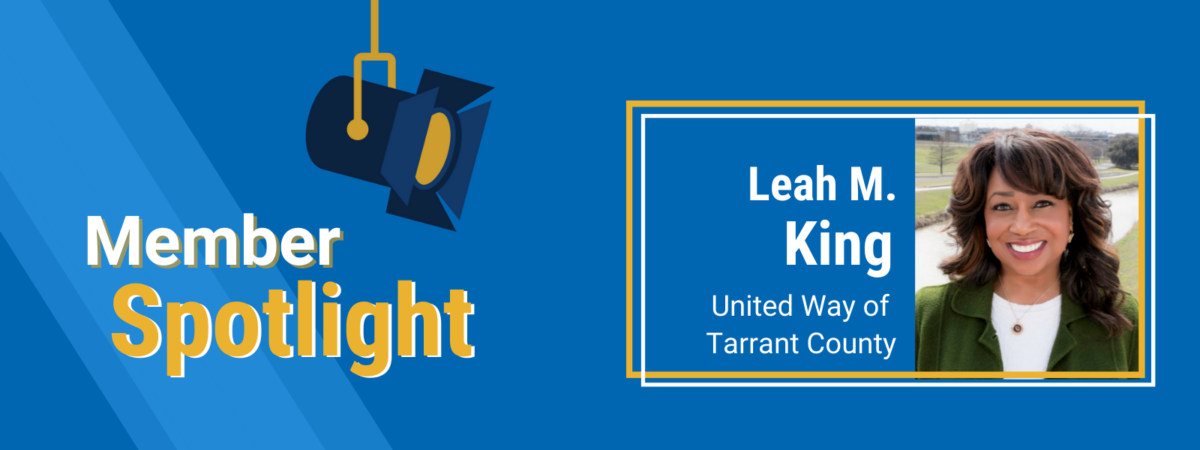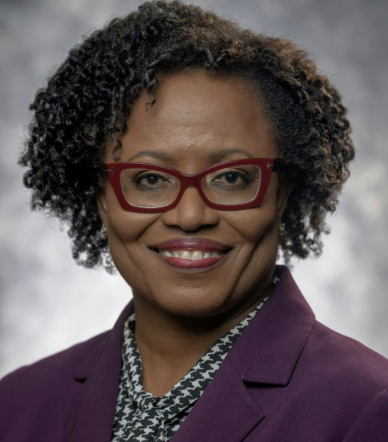 Meet our members! AFN’s greatest asset is our members—a diverse network of national, regional, and community-based foundations, financial institutions, and grantmakers—investing in advancing equitable wealth building and economic mobility. Check back each month and meet your peers!
Meet our members! AFN’s greatest asset is our members—a diverse network of national, regional, and community-based foundations, financial institutions, and grantmakers—investing in advancing equitable wealth building and economic mobility. Check back each month and meet your peers!
1: What is the mission of your organization and how is advancing equitable wealth building and economic mobility incorporated into the work?
Our mission is to provide leadership and harness resources to solve Tarrant County’s toughest social challenges. More specifically, several of our programs and initiatives are designed to address longstanding disparities and barriers to economic stability; two examples are our Brave/R Together initiative and VITA.
Brave/R Together declares that our community will no longer address the issues of race and racism in silos. We will Brave/Race Together by breaking the silence on the root causes of systemic inequities in communities of color. By investing in education, access to healthcare, affordable housing and supporting Black and Brown entrepreneurs in targeted communities that have been neglected for generations. Entrepreneurs in these areas of focus receive access to courses to walk them through the MWBE certification process, real-time coaching by experienced business owners, and access to an on-demand library of resources that are relevant to their needs.
Our VITA (volunteer income tax assistance) program is available to any household with annual earnings of $60,000 or less. Clients are able to access free, professional tax-preparation by IRS certified volunteers and staff. Over the past decade, United Way of Tarrant County has helped these families receive more than $150 million in tax refunds, money that otherwise may have not been returned or a significant portion may have been paid to for-profit tax preparation companies. These families have access to financial coaching, job training, ESL courses, and more.
2: What are some of the permanent pivots you have made as a result of the COVID-19 pandemic and the current moment emphasizing the critical need for strategies that provide a range of support to women and Black, Latinx, Indigenous and Asian people and communities?
COVID-19 challenged our organization to re-evaluate a number of ways we work together internally and how we operate externally. One critical thing that we will continue to do is urge collaboration and collective impact models, not only in what we do but throughout the nonprofit and public-sector. There were a number of instances during the pandemic that our government friends would see a need but not be nimble enough to respond at the speed the public needed; they relied on our partnership to help facilitate a number of projects including distribution of millions of pieces of personal protective equipment and distribute tens of millions of dollars in CARES ACT funding. These types of partnerships are crucially important to streamline our respective abilities to support families by leaning into our respective core competencies. What we found is that by entering into these types of partnerships, it also sped up access to resources to women, older adults, Black, Latinx, Indigenous and Asian communities.
s
3: What are some of the most significant gaps that you have identified that could help address economic equity?
The biggest gap, in my opinion, is the complete lack of knowledge, understanding and acknowledgement of how we got here as a society to begin with. It seems to me that the sooner we all accept the fact of how nearly all large-scale systems were created, and who they were intended to include and directly exclude, it helps to understand how we arrived where we are and helps inform what needs to happen to move forward. This reality is a major contributor to trust gaps, especially of large systems. Our infant mortality rate is a prime example of how mostly preventable problems cause premature birth, low-birth-weight and premature death in our babies. And once again, Black babies experience worse health outcomes than any other group. We also have significant housing gaps, access to capital for women and business owners of color, and sadly too many additional examples.
4: Thinking about your previous answer, what do you see as the biggest barriers or challenges for philanthropy to address these gaps?
Acknowledging how the issues got to be as big as they are and committing to really do something productive about it. It doesn’t mean just providing funding to leaders of color; think more deeply, strategically and long-term. Commit to understanding the most critical needs in your area and really take a deep dive to understand how the situation came to be and apply support at the root of the problem. THEN guide resources toward organizations led by people of color but also provide training and development to ensure more women and people of color have the opportunity to advance, especially at larger nonprofit organizations.
s
5: What have been some of the biggest benefits of being part of the Asset Funders Network?
Being part of Asset Funders Networks has been a game changer for United Way of Tarrant County. Whether having the opportunity to brainstorm with organizations with similar focus and goals, identifying opportunities to jointly fund initiatives that strengthen our nonprofit community, learning from our peers on initiative successes, previewing things we are considering and receiving valuable feedback, and the overall comradery are more than we could have ever wished.
6: What is the last book you read?
The Color of Law: A Forgotten History of How Our Government Segregated America by Richard Rothstein
About Leah M. King, President & CEO, United Way of Tarrant County
United Way of Tarrant County (Fort Worth, TX area) brings people together to build strong communities where everyone thrives. As a nonprofit leader, we help communities tackle tough challenges and work with private, public and nonprofit partners to boost education, financial stability and access to health resources.
Leah is responsible for leading the organization in its service to the Tarrant County community.

